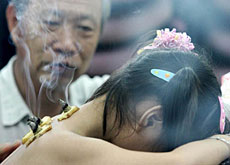Voters to decide on alternative medicine

Swiss voters will have the final say on whether alternative medicine should be covered by the basic health insurance scheme.
The government decided more than three months ago to cut five types of therapy from basic cover as it battles to reduce spiralling health costs.
Backers of complementary medicine have collected 140,000 signatures in just under a year to force a nationwide vote. They had until next March to gather the required 100,000 signatures.
Their aim is to ensure that practitioners of alternative medicine are recognised and guarantee that all costs associated with these types of treatment are reimbursed under compulsory health insurance.
They also want to improve collaboration between practitioners of alternative medicine and traditional medical care, and put all types of treatment on an equal footing.
But should voters accept to enshrine complementary medicine in the constitution, basic health insurance will only cover treatments dispensed by recognised doctors.
Opinion polls have found that four out of five Swiss think that complementary medicine should continue to be paid for under the basic health-insurance scheme.
“It’s up to voters to decide what should be covered by compulsory health insurance,” said Christian Democrat parliamentarian Rosemarie Zapfl on Thursday. “There is a demand for this type of treatment because it works.”
No cover
The vote looms not long after Interior Minister Pascal Couchepin, who has the health portfolio, announced that five types of complementary medicine would no longer be covered by basic health insurance.
He said they failed to meet the criteria on efficacy, suitability and cost-effectiveness laid down in Switzerland’s health-insurance law.
In 1999 the interior ministry ruled that five therapies – homeopathy, herbal medicine, neural therapy, traditional Chinese medicine and anthroposophic medicine – should be covered provisionally by basic health insurance.
The scheme, which ran for a trial period of five years, was aimed at assessing the potential of these therapies.
According to a recent survey, one-third of the population has consulted a doctor specialising in complementary medicine at least once. In 2003, this type of treatment accounted for 0.2 per cent of health insurers’ costs.
The decision to cut the five therapies was widely criticised.
The Union of Associations of Swiss Physicians for Complementary Medicine said at the time the interior ministry was making a mistake, while the main Swiss doctors’ association described Couchepin’s announcement as counterproductive.
swissinfo with agencies
In Switzerland there are 270 doctors offering homeopathy.
Between 300 and 400 offer traditional Chinese medicine (acupuncture excluded).
There are 250 doctors specialising in herbal medicine.
106 doctors specialise in neural therapy.
150 offer anthroposophic medicine.
Backers of complementary medicine began collecting signatures late in September last year.
Since July 1 this year, five types of alternative treatment are no longer reimbursed by the compulsory health insurance scheme.
These therapies had been provisionally admitted for a five-year trial period.

In compliance with the JTI standards
More: SWI swissinfo.ch certified by the Journalism Trust Initiative










You can find an overview of ongoing debates with our journalists here . Please join us!
If you want to start a conversation about a topic raised in this article or want to report factual errors, email us at english@swissinfo.ch.